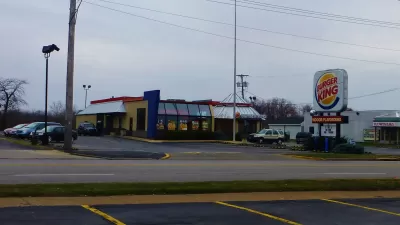Though cities like Los Angeles have established moratoriums on the construction of new fast food residents in an effort to tackle obesity, a new study questions the importance of place-based causes and solutions.
"In a new study, researchers from the University of North Carolina led by nutrition professor Barry Popkin have found that even when they are not eating at fast-food restaurants, children who frequent them tend to eat food that would probably make many of them overweight or obese anyway," reports Melissa Healy. "The authors of the latest research combed through a national database of Americans' health and nutrition behaviors and grouped 4,466 American kids--from ages 2 to 18--according to what they ate when they were not eating food purchased at a fast-food restaurant."
"'Our findings suggest that the location where foods are obtained may not be as important as the nutritional quality of the foods consumed,' the authors wrote. They also suggest that 'the effect of public health efforts targeted at fast food restaurants may also be overestimated, such that these efforts may be necessary but not sufficient to reduce child obesity if the remainder of the diet is not addressed.'"
FULL STORY: Fast food isn't making our kids fat. It's the rest of their diet.

Study: Maui’s Plan to Convert Vacation Rentals to Long-Term Housing Could Cause Nearly $1 Billion Economic Loss
The plan would reduce visitor accommodation by 25,% resulting in 1,900 jobs lost.

North Texas Transit Leaders Tout Benefits of TOD for Growing Region
At a summit focused on transit-oriented development, policymakers discussed how North Texas’ expanded light rail system can serve as a tool for economic growth.

Why Should We Subsidize Public Transportation?
Many public transit agencies face financial stress due to rising costs, declining fare revenue, and declining subsidies. Transit advocates must provide a strong business case for increasing public transit funding.

How to Make US Trains Faster
Changes to boarding platforms and a switch to electric trains could improve U.S. passenger rail service without the added cost of high-speed rail.

Columbia’s Revitalized ‘Loop’ Is a Hub for Local Entrepreneurs
A focus on small businesses is helping a commercial corridor in Columbia, Missouri thrive.

Invasive Insect Threatens Minnesota’s Ash Forests
The Emerald Ash Borer is a rapidly spreading invasive pest threatening Minnesota’s ash trees, and homeowners are encouraged to plant diverse replacement species, avoid moving ash firewood, and monitor for signs of infestation.
Urban Design for Planners 1: Software Tools
This six-course series explores essential urban design concepts using open source software and equips planners with the tools they need to participate fully in the urban design process.
Planning for Universal Design
Learn the tools for implementing Universal Design in planning regulations.
Ascent Environmental
Borough of Carlisle
Institute for Housing and Urban Development Studies (IHS)
City of Grandview
Harvard GSD Executive Education
Toledo-Lucas County Plan Commissions
Salt Lake City
NYU Wagner Graduate School of Public Service



























